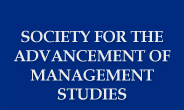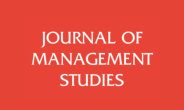Proposal submission deadline: 30 April 2026
Guest Editors (in alphabetical order):
Donald Bergh, University of Denver, USA
Marylène Gagné, Curtin University, Australia
Pursey Heugens, Rotterdam School of Management, The Netherlands
David Ketchen, Auburn University, USA
Jane Lê, WHU, Germany
JMS Editor: Brian Boyd, University of Northern Arizona, USA
BACKGROUND
A series of Journal of Management Studies articles have called for mobilizing methodological tools to drive and improve theorizing (e.g., Alvesson & Sandberg, 2013; Cornelissen, 2017; Donaldson, Qiu & Luo, 2013; Harley & Faems, 2017; Spicer & Alvesson, 2025; Wickert, Post, Doh, Prescott & Prencipe, 2021). However, methodological research has typically been depicted in a supporting role to theory, focusing on measurement precision, testing, rigor, and transparency (Aguinis & Edwards, 2014). Management scholars have devoted less attention to how methodological advancements might facilitate the isolation of underlying mechanisms that could advance theory. Such developments could help scholars keep pace with rapid transformation (Amis & Greenwood, 2021), foster the ability of management science to “break new ground” (Cornelissen & Durand, 2014, p. 995), and generate new insights into increasingly complex issues (Wickert et al., 2021).
Advances in research methods offer opportunities to explore new research questions and advance theoretical progress. The creation of a new method, introduction of concepts from another field, or evolution of an existing approach can all have significant theoretical implications (Alvesson & Sandberg, 2013; Lê & Schmid, 2022). Substantive methodological synergies, whereby new methods provide novel insights into important substantive issues, abound due to the rapid development of advanced statistical modeling methods to deal with reflective constructs and dynamic multidetermination. Examples of these synergies include the use of computational modeling to develop theories of entrainment and emergence (Ballard et al., 2019), bi-factor modeling to validate the theoretical structure of multilevel constructs (Howard et al., 2018), and growth modeling and location-scale modeling to develop models of dynamic change and convergence over time (McNeish, 2021).
AIMS AND SCOPE OF THIS SPECIAL ISSUE
This special issue seeks research on the method-theory relationship that produces theoretical development and improvement. Research spanning qualitative, quantitative, and critical management studies, as well as the micro, macro, and meso traditions of management scholarship, is welcome. Papers focusing purely on methods and methodological innovation, without an explicit link to theorizing, are not well-suited to this special issue. Instead, we seek papers that explicitly address methods and their value for theorizing in the service of advancing the management field.
Submissions are likely to be successful to the extent that they:
- Offer originality in terms of methods and theorizing from such methods.
- In the qualitative space, this might include critical methods (e.g., CDA, critical feminist/cultural methodologies) or methods that have been less explored in management studies (e.g., ethnomethodology, conversational analysis, auto, and urban ethnography).
- In the quantitative space, this might include advanced statistical modeling methods, computational modeling, NK modeling, bi-factor modeling, social networks, and growth and location-scale modeling, as well as neuroscience, and multivariate meta-analysis.
- Offer originality in terms of combinations of methods and/or methods and theory.
- This might include advanced mixed methods designs or unusually but effective combinations of different methods and/or methods and theory (e.g., grounded theory and narrative analysis; interpretive comparative case study; computational modeling to develop theories of entrainment and emergence; within- and between-firm in longitudinal testing, growth modeling to develop models of dynamic change and convergence).
- This might also include approaches that investigate reflective constructs and dynamic multi-determination.
- Include promising new designs, measures, tools, and technologies as part of their methodological toolset that offer significant potential to advance theory.
- Such technologies in the qualitative space might include AI and machine learning, as well as crisp and fuzzy set qualitative and comparative analysis, and video and image analytic tools.
- Such technologies in the quantitative space might include methods for creating new datasets, developments in design that improve causal inferences, advanced statistical software and modeling tools, creative remedies to address endogeneity, and longitudinal hierarchical modeling.
- Focus on ways in which methods can reinvigorate theoretical bodies.
- Papers in this space might examine how and why methods stop generating novel theoretical insights and propose ways to invigorate specific bodies of work.
- Similarly, they might study the affordances of particular methods and how these might ‘capture’ a field and lead to the plateauing of theory.
- Address challenges and current questions in research methods.
- In qualitative methods, this might include questions about what constitutes viable and generative alternatives to templates, the benefits and challenges that extreme contexts offer, and how scholars can conduct multi-context and multi-level analysis effectively.
- In quantitative methods, this might include ways to validate the theoretical structure of multilevel constructs, as well as validity and reliability assumptions and properties, and testing different conceptualizations of temporal relationships.
- Methods for improving replication and transparency to advance theory generalization in both qualitative and quantitative research.
In terms of substantive topics, an illustrative but not comprehensive set of possibilities includes:
- Managing organizations in ideologically laden times, where management practices are affected by ideological factors in complex ways.
- Managing the changing workplace (e.g., Gen Z employees, new work).
- Managing the centrality of technology (e.g., GenAI as an actor; recasting the role of agency).
- Managing within a surveilled society (e.g., the role of government and social media).
- Managing classical management issues in collaborative or temporary organizations.
These topics should serve as an inspiration – we are also open to papers that address other dimensions of the methods-theory link in management studies, as well as all ontological, epistemological, and methodological traditions and their implications for theorizing. Additionally, we welcome papers on different approaches to theorizing and their implications.
SUBMISSION PROCESS AND DEADLINES
Submissions will follow a two-step process:
First, an article proposal must be submitted via the JMS ScholarOne system website (https://mc.manuscriptcentral.com/jmstudies), with an indication that the submission is intended for the method-theory SI. Proposals should conform to the general JMS formatting requirements and be no longer than five pages single-spaced, excluding references, tables, or figures (see: http://www.socadms.org.uk/wp-content/uploads/JMS-ManuscriptPreparationGuidelines.pdf). The proposal should indicate the overall topic or relationship of interest, the methodological contribution, and the novel theoretical implication. The Guest Editors will endeavor to return a decision on the proposal no later than 15 June 2026.
Second, proposals invited for development into full paper submissions will then be reviewed according to the JMS double-blind review process. Only papers previously submitted as proposals and invited for consideration as full papers will be considered for publication.
Please note the following dates:
- Proposal submission deadline: 30 April 2026.
- Full paper submission deadline: 31 January 2027.
- Anticipated publication date: late 2028.
We welcome informal inquiries about the Special Issue, proposed topics, and potential fit with the Special Issue objectives. Please direct any questions on the Special Issue to the Special Issue Editors (in alphabetical order):
- Donald Bergh (dbergh@du.edu)
- Brian Boyd (Boyd@nau.edu)
- Marylène Gagné (gagne@curtin.edu.au)
- Pursey Heugens pheugens@rsm.nl
- David Ketchen (ketchda@auburn.edu)
- Jane Lê (Le@whu.edu)
SPECIAL ISSUE EVENTS
We will hold an online workshop/information session on 1 February 2026. Further details to follow.
We intend to hold paper development workshops for invited papers at the Academy of Management Conference, August 2026, and the British Academy of Management Conference, September 2026. Details to be confirmed.
Participation in the information sessions or workshop does not guarantee acceptance of the paper in the Special Issue and attendance is not a prerequisite for publication.
REFERENCES
Alvesson, M. and Sandberg, J. (2013). ‘Have management studies lost their way? Ideas for more imaginative and innovative research’. Journal of Management Studies, 50), 128-152.
Aguinis, H. and Edwards, J. R. (2014). ‘Methodological wishes for the next decade and how to make wishes come true’. Journal of Management Studies, 51, 143–174.
Amis, J. M. and Greenwood, R. (2021). ‘Organizational change in a (post‐) pandemic world: Rediscovering interests and values’. Journal of Management Studies, 58, 582–586.
Ballard, T., Palada, H., Griffin, M. and Neal, A. (2021). ‘An integrated approach to testing dynamic, multilevel theory: Using computational models to connect theory, model, and data’. Organizational Research Methods, 24, 251–284.
Cornelissen, J. (2017). ‘Preserving theoretical divergence in management research: Why the explanatory potential of qualitative research should be harnessed rather than suppressed’. Journal of Management Studies, 53, 368-383
Cornelissen, J. P. and Durand, R. (2014). ‘Moving Forward: Developing Theoretical Contributions in Management Studies’. Journal of Management Studies, 51, 995–1022.
Donaldson, L., Qiu, J. and Luo, B. N. (2013). ‘For rigor in organizational management theory research’. Journal of Management Studies, 50, 153–172.
Harley, B. and Faems, D. (2017). ‘Theoretical progress in management studies and the role of qualitative research’. Journal of Management Studies, 54, 366–367.
Howard, J. L., Gagné, M., Morin, A. J. and Forest, J. (2018). ‘Using bifactor exploratory structural equation modeling to test for a continuum structure of motivation’. Journal of Management, 44, 2638-2664.
Lê, J. K. and Schmid, T. (2022). ‘The practice of innovating research methods’. Organizational Research Methods, 25, 308–336.
McNeish, D. (2021). ‘Specifying location-scale models for heterogeneous variances as multilevel SEMs’. Organizational Research Methods, 24, 630–653.
Spicer, A. and Alvesson, M. (2025). ‘Critical management studies: A critical review’. Journal of Management Studies, 62, 446–483.
Wickert, C., Post, C., Doh, J. P., Prescott, J. E. and Prencipe, A. (2021). ‘Management research that makes a difference: Broadening the meaning of impact’. Journal of Management Studies, 58, 297–320.

